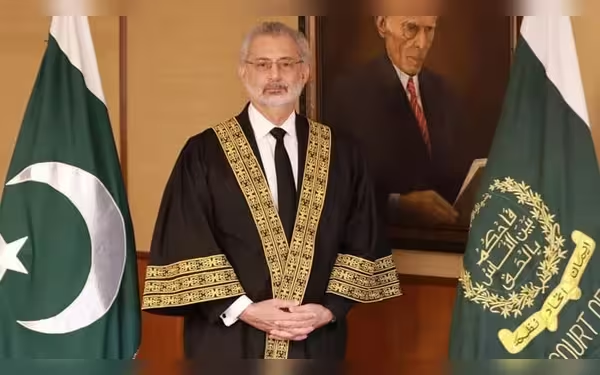Saturday, November 16, 2024 10:32 PM
CJP Isa Justifies Justice Akhtar's Replacement in Judges' Committee
- CJP Isa cites accountability for Justice Akhtar's removal.
- Justice Akhtar criticized for neglecting urgent constitutional cases.
- Concerns raised over concentration of power in judiciary.
 Image Credits: thenews
Image Credits: thenewsCJP Isa explains reasons for replacing Justice Akhtar in judges' committee amid concerns over judicial accountability and transparency.
In a significant development within Pakistan's judiciary, Chief Justice of Pakistan (CJP) Qazi Faez Isa has provided multiple reasons for his decision to replace Justice Munib Akhtar in the judges' committee. This decision comes in the wake of the new Supreme Court (Practice and Procedure) Amendment Ordinance 2024, which was enacted on September 20, 2023. The ordinance grants the chief justice the authority to nominate judges for the committee responsible for forming benches, thereby altering the dynamics of judicial appointments.
Following the promulgation of the ordinance, CJP Isa nominated Justice Amin-Ud-Din Khan to take Justice Akhtar's place in the three-member judges' committee. In a letter addressed to senior puisne judge Justice Mansoor Ali Shah, who had expressed concerns regarding this change, CJP Isa emphasized that he is not legally obligated to disclose the reasons for his nomination. However, he stated, "Since I have always advocated accountability and transparency, I shall provide reasons why Justice Akhtar has been replaced." He further noted that his decision was made in response to Justice Shah's insistence, indicating a desire to maintain open communication within the judiciary.
CJP Isa outlined eleven reasons for the removal of Justice Akhtar, highlighting that the latter had been a vocal opponent of the Supreme Court (Practice and Procedure) Act, which aimed to diminish the chief justice's dominance over the Supreme Court. The chief justice pointed out that Justice Akhtar had taken full summer vacations, seemingly indifferent to the growing backlog of cases. This lack of availability raised concerns, especially as Justice Akhtar insisted on participating in committee meetings despite being on vacation, which suggested a lack of trust in the next senior judge, Justice Yahya Afridi.
Moreover, CJP Isa criticized Justice Akhtar for neglecting urgent constitutional cases during his time off, stating that the Act mandates urgent cases to be addressed within 14 days. He also noted that Justice Akhtar had shown disrespect towards senior judges by selectively choosing to hear only 1,100 specific cases, a practice that is unprecedented in the judiciary. Additionally, Justice Akhtar's refusal to allow ad hoc judges to participate in the Shariat Appellate Bench was cited as another reason for his removal.
Further compounding the situation, CJP Isa mentioned Justice Akhtar's rude behavior towards a distinguished committee member and his tendency to walk out of meetings. The chief justice expressed concerns that the bench led by Justice Akhtar frequently adjourned cases and often concluded its work before 11 a.m., a point raised by his fellow judges. He also highlighted that Justice Akhtar had issued a stay order in the audio leaks case without scheduling it for a hearing.
In response to these developments, Justice Mansoor Ali Shah raised concerns about the reconstitution of the judges' committee and the abrupt removal of Justice Akhtar. He pointed out that no clear reasons were provided for this decision, nor for the choice of the fourth senior-most judge over the second senior-most judge. Justice Shah criticized what he termed "unfortunate cherry picking" and an undemocratic display of power, emphasizing the importance of collegial decision-making within the judiciary. He argued that concentrating administrative powers in the hands of a single individual undermines the principles of democratic governance and judicial fairness.
This unfolding situation within the Supreme Court raises critical questions about the balance of power and the principles of accountability and transparency in the judiciary. As the legal community and the public closely observe these developments, it is essential to reflect on the implications of such decisions for the integrity of the judicial system. The ongoing discourse surrounding judicial appointments and the role of senior judges will undoubtedly shape the future of Pakistan's legal landscape, highlighting the need for a fair and transparent process that upholds the rule of law.













